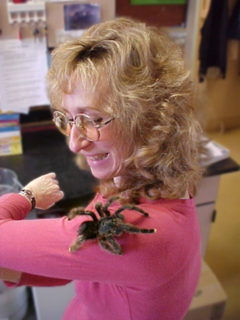A Quote by Colin McGinn
It is an odd fact of evolution that we are the only species on Earth capable of creating science and philosophy. There easily could have been another species with some scientific talent, say that of the average human ten-year-old, but not as much as adult humans have; or one that is better than us at physics but worse at biology; or one that is better than us at everything. If there were such creatures all around us, I think we would be more willing to concede that human scientific intelligence might be limited in certain respects.
Quote Topics
Adult
Another
Around
Average
Been
Better
Biology
Capable
Certain
Concede
Could
Could Have Been
Creating
Creatures
Earth
Easily
Everything
Evolution
Fact
Human
Humans
Intelligence
Limited
Might
More
Much
Odd
Old
Only
Philosophy
Physics
Respects
Say
Science
Science And Philosophy
Scientific
Some
Species
Talent
Ten
Than
Think
Us
Were
Willing
Worse
Would
Would Be
Year
Related Quotes
Science, by itself, cannot supply us with an ethic. It can show us how to achieve a given end, and it may show us that some ends cannot be achieved. But among ends that can be achieved our choice must be decided by other than purely scientific considerations. If a man were to say, "I hate the human race, and I think it would be a good thing if it were exterminated," we could say, "Well, my dear sir, let us begin the process with you." But this is hardly argument, and no amount of science could prove such a man mistaken.
The confidence in the unlimited power of science is only too often based on a false belief that the scientific method consists in the application of a ready-made technique, or in imitating the form rather than the substance of scientific procedure, as if one needed only to follow some cooking recipes to solve all social problems. It sometimes almost seems as if the techniques of science were more easily learnt than the thinking that shows us what the problems are and how to approach them.
It has been an obsession of human beings to create a hierarchy that places the human species on top and lumps all the "other animals" together beneath us. The resulting "speciesism" allows us to look upon animals as less deserving of all manner of rights and considerations than humans. To support this lower status, humans have argued that animals act instinctually; don't have souls; don't feel physical pain like we do; and lack self-consciousness, cognitive intelligence, emotional feelings, morality, and ethics.
It was not that I disliked people; some of them were interesting and kind. But even the nice ones were no more compelling or important to me than other creatures. Then, as now, to me humans are but one species among billions of other equally vivid and thrilling lives. I was never drawn to other children simply because they were human. Humans seemed to me a rather bullying species, and I was on the side of the underdog.
When I am at a dinner table, I love to ask everybody, 'How long do you think our species might last?' I've read that the average age of a species, of any species, is about two million years. Is it possible we can have an average life span as a species? And do you picture us two million years more or a million and a half years, or 5,000?
If we consider the superiority of the human species, the size of its brain, its powers of thinking, language and organization, we can say this: were there the slightest possibility that another rival or superior species might appear, on earth or elsewhere, man would use every means at his disposal to destroy it.
It must be stressed that there is nothing insulting about looking at people as animals. We are animals, after all. Homo sapiens is a species of primate, a biological phenomenon dominated by biological rules, like any other species. Human nature is no more than one particular kind of animal nature. Agreed, the human species is an extraordinary animal; but all other species are also extraordinary animals, each in their own way, and the scientific man-watcher can bring many fresh insights to the study of human affairs if he can retain this basic attitude of evolutionary humility.
Scientific education for the masses will do little good, and probably a lot of harm, if it simply boils down to more physics, more chemistry, more biology, etc to the detriment of literature and history. Its probable effect on the average human being would be to narrow the range of his thoughts and make him more than ever contemptuous of such knowledge as he did not possess.
Humans are particularly interesting; our culture is incredible, there's no doubt about that. In many respects, no other species matches ours. But in quite a few respects, they do, and that can help us, perhaps, to better understand our own culture. We look at the ways humans are similar to other animals, and at the ways they differ, rather than just saying, "We have culture and you don't."
In the annals of science fiction, where dystopias rule the imaginative roost, Star Trek stood nearly alone in telling us that our future would be better than our past, that our common problems would be solved, that we, as a species, were fundamentally good, and that the universe would reward us for our goodness.
Another British study discovered that average eight-year-olds were better able to identify characters from the Japanese card trading game Pokemon than native species in the community where they lived: Pikachu, Metapod, and Wigglytuff were names more familiar to them than otter, beetle, and oak tree.









































